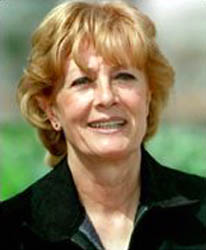
...in fact, the actress is anything but anti-Semitic. Both before and after her blacklisting she demonstrated concern and horror for the Jewish victims of the Holocaust. No one who saw her harrowing performance in "Playing for Time," a part for which she cut off all her hair rather than wear a wig, could doubt her empathy for the character she portrayed. In 1977 she won an Academy Award for her role as the Jewish heroine of the anti-Nazi underground in "Julia," a film based on a book by Lillian Hellman. In receiving the award she gave credit to the fact that her co-star, Jane Fonda, and her director, Fred Zinnemann, "believed in what we were expressing," the fight against "racist Nazi Germany." Then, as members of the Jewish Defense League protested noisily outside, she demonstrated her contempt for their strongarm tactics of physical intimidation by referring to them as "a small bunch of Zionist hoodlums whose behavior is an insult to the stature of Jews all over the world."
-
From there she went to the site of Tal al-Zaatar, where she and her crew filmed the devastation and spoke with Palestinians who had survived the siege, including the two doctors who had run the single clinic that served the camp's inhabitants. She visited Sabra and Shatila, the refugee camps in Beirut where five years later Lebanese militias massacred at least 900 men, women and children under the eyes of Israeli soldiers, who prevented the inhabitants from escaping. During her stay in these camps she filmed hospitals run by the Palestinian Red Crescent Society and marvelled at their ingenuity in treating seriously ill patients with primitive equipment.
Proceeding to southern Lebanon, she and her crew went from town to town, talking with the inhabitants and sleeping on floors or cots, often in makeshift shelters, under nightly barrages of Israeli shells. She eventually met and interviewed Abu Jihad, a high-ranking PLO leader who remained a close friend until 1988, when he was assassinated in his Tunis apartment in front of his family by Israeli commandos. (Redgrave writes that on hearing the news, "I immediately flew to Tunis to pay my respects to Um Jihad and her children.") Finally, she interviewed Arafat himself. Like many of the Palestinians she had talked with, Arafat hold her, "We are not against the Jews: we are against Zionism...Why not speak about living together, all of us in this homeland? I think that in the future, all the Jews will understand that we are fighting for them too."
After her experience in Lebanon, Redgrave concluded that "Everything Winnie Mandela wrote about her people under apartheid is true of the Palestinians...with one essential difference: Palestinians do not have the right to live in their own country, not even to be buried there."
"The Palestinian" premiered in November 1977 at the London Film Festival, but in the U.S. neither the Public Broadcasting Service nor any other network would show it. Nevertheless, an actor who had seen a private screening of the film gave a distorted account to a gossip columnist and the news of Redgrave's support for the PLO spread rapidly. Because of her sympathy for the Palestinians, she was accused of being a terrorist. At a meeting in Los Angeles one speaker waved a fistful of dollars and shouted, "Who is willing to rid the world of a Jew-baiter?"
In March 1978 Israel launched one of its periodic invasions of Lebanon, and less than a month later Redgrave again flew to Beirut and drove south. In her book she describes the ruins of Sidon and Tyre, where Israeli bombs had reduced entire apartment blocks to rubble. Rescuers were still pulling bodies from the wreckage and the pools of water from shattered water mains were red with blood in this preview of Israel's even bloodier 1982 invasion. Redgrave noted that although more than 100,000 Lebanese people were injured or made homeless, and their farms and workplaces destroyed, no medicine or other aid was sent from the U.S. or Europe. At the U.N., the U.S. and Britain vetoed resolutions condemning the invasion.
Redgrave continued her support for the Palestinian struggle. In March 1988, three months after the start of the intifada, she gathered a group of Arab and Jewish musicians for a benefit concert in London that raised $100,000 for Palestinian children. Immediately afterwards, she organized an international conference in Moscow calling for an end to the Israeli occupation and opposition to anti-Semitism. Why Moscow? Because Russia's history was marked by virulent anti-Semitism and to Redgrave, "The struggle against anti-Semitism and for self-determination of the Palestinians are one and the same, and they form a single whole." In 1989 she helped the newly formed Moscow Jewish Theatre to survive by bringing it to London.
Washington Report on Middle East Affairs
��������������������������������
I have just returned from a theatre workshop in Croatia, with women who survived Tito's concentration camp for political prisoners on the island of Goli Otok. Officially this was a "work site" or "labour camp", and was opened by the Yugoslav State Security Service in 1948, when Tito split from Stalin.In the name of security, our Government is destroying the principles and the laws which are the foundations of the security of all citizens; these principles were proclaimed by the American Patriots in their Declaration of Independence and after the war, in their constitution which also prohibits cruel and degrading treatment.
All the survivors of Goli Otok (the island had a camp for men as well) agree that under prolonged conditions of torture, they would do anything, say anything, write anything and sign anything that was demanded of them in the hope of being released.
Vanessa Redgrave
Independent UK 23.Aug.04
-
link KWSnet 24.Aug.04

